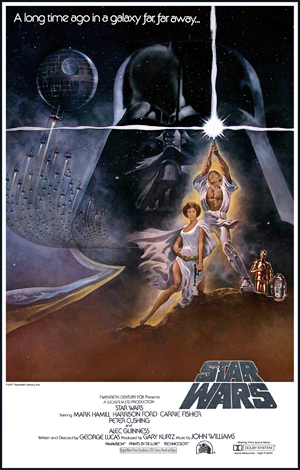
The Problem With Star Wars
 Star Wars has been a phenomenally popular movie franchise. The original Star Wars came out in 1977 and was an instant success. But when I first watched it, I was not impressed. My first impression was that it was the King Arthur legend in outer space. Even at the age of 14 I had expectations of my science fiction adventures. We all have a sense of a good story when we see one. But when I first saw Star Wars, there were things missing. Let’s look at one of the flaws of Star Wars and why the film has endured despite it.
Star Wars has been a phenomenally popular movie franchise. The original Star Wars came out in 1977 and was an instant success. But when I first watched it, I was not impressed. My first impression was that it was the King Arthur legend in outer space. Even at the age of 14 I had expectations of my science fiction adventures. We all have a sense of a good story when we see one. But when I first saw Star Wars, there were things missing. Let’s look at one of the flaws of Star Wars and why the film has endured despite it.
The Elements of Good Storytelling
At Agile Writers, we follow the basic pattern of the Hero’s Journey as laid out by Joseph Campbell in his seminal work The Hero With a Thousand Faces:
- The Hero starts out in his ordinary world
- Something happens that upsets the hero’s world
- And he is cast into an unfamiliar world
- Where he makes new friends, enemies, and overcomes trials
- After overcoming a major crisis
- The hero returns to his ordinary world, with a lesson learned.
What Star Wars is Lacking
Star Wars follows this pattern nearly to a tee. However, one thing lacking is the lesson learned. What is it that Luke understands about the universe that he didn’t understand at the beginning?
Luke starts out with what we call a “Missing Inner Quality.” He lacks confidence. In the end, he acquires this confidence when he trusts in the Force. So we have to ask ourselves, is this the message of this film? Is this the lesson learned?
If so, then the lesson learned is that we should all trust in the Force to resolve our issues. But the Force is a fictional element of a fictional galaxy, long ago and far away. This is not a message that any of us can use.
Alternatively, you might argue that the point of Star Wars is that we should trust in some higher power. But that doesn’t really seem to be the message that George Lucas was attempting to impart. We don’t really see Luke or any other character giving praise and credit to the higher power. Using the Force in the final scenes of the film is merely the device that signifies Luke has overcome his lack of confidence and has found a new confidence in the Force.
Why Star Wars is Popular
What Star Wars does right is the use of archetypes in story telling. These are fundamental character types that all humans seem to recognize intrinsically. The archetypes Star Wars employs are:
- The young hero (Luke)
- The damsel in distress (Leia)
- The comic sidekicks (R2D2 & C3PO)
- The rascal (Han)
- The mentor (Obi Wan)
- The villain (Darth Vader)
When we see these elements combined in the right ways, we are instantly engrossed in the story. You can see them employed over and over again in storytelling. Look at The Karate Kid, The Wizard of Oz, and The Matrix.
When George Lucas created his story, he consulted Joseph Campbell on the use of these mythical archetypes. He got this right. He got it so right that he was able to build an empire from this one story, and overcome a critical flaw.
The Serial and Roller Coaster Rides
Lucas based the structure of Star Wars, in part, on the serial movie shorts of his youth. Serials like Flash Gordon, for example, were episodic and often began with a recap of previous episodes. So, also, does Star Wars begin with an opening scroll.
These action/adventure stories were designed to thrill and excite young movie goers. They weren’t meant to teach a deep lesson. The idea was to pull the viewer in and keep them coming back for more in subsequent releases. As such, they are very much roller coaster rides.
At Agile Writers, I warn writers away from writing roller coaster rides. When you begin your story, you are entering into a contract with the reader. That contract is that you promise if the reader hangs in there with you, you will deliver a story with a point to it. If the reader gets to the end of the story and there is no point, they will wonder why they spent the time and money on your story.
Have a Message
Roller coaster rides are fun. They are nice once in a while. However, as a beginning writer, I advise you to have a message to impart upon your reader. You have an opinion about the world we live in. You have a unique perspective about this world. Draw upon your unique experiences to craft a story that imparts a message to your readers that will enrich and engage them. That is the ultimate point of story.